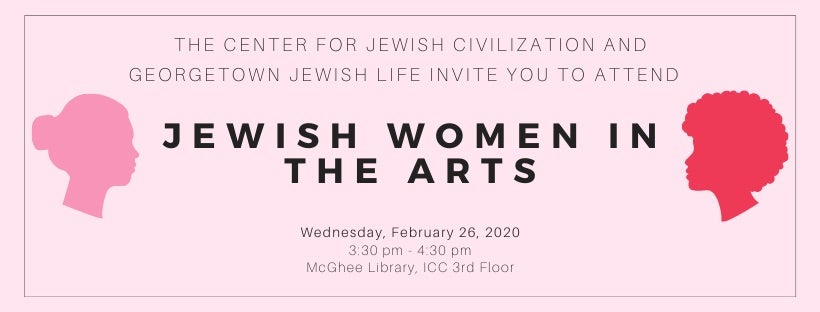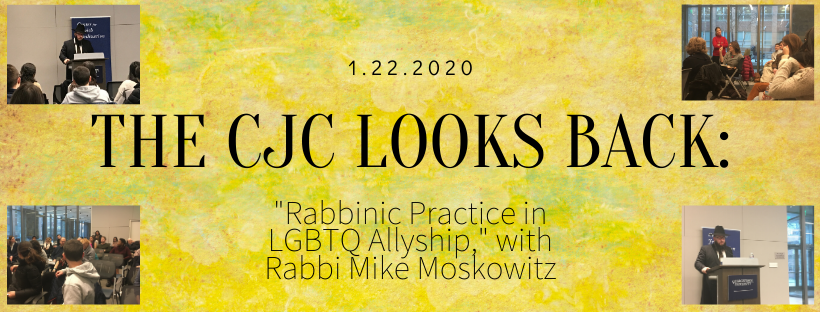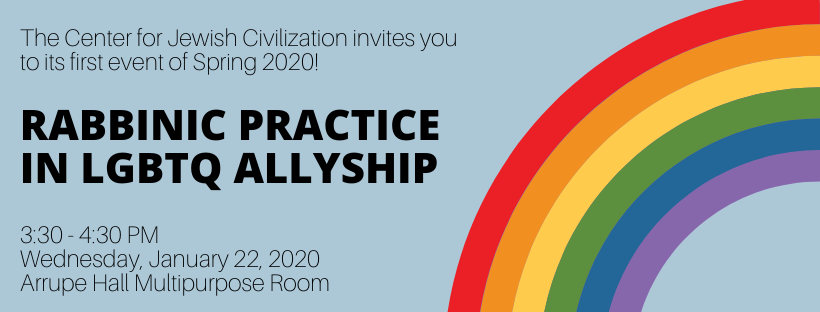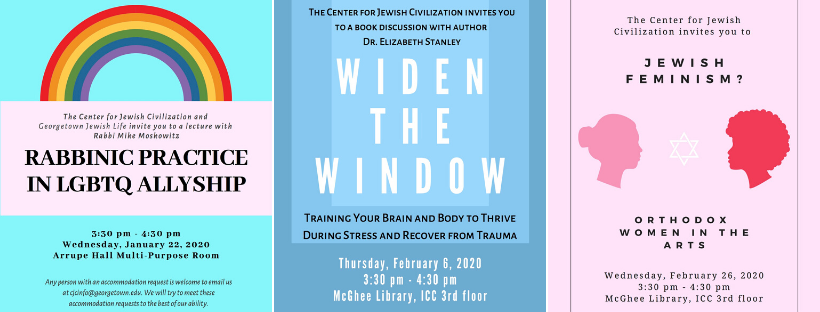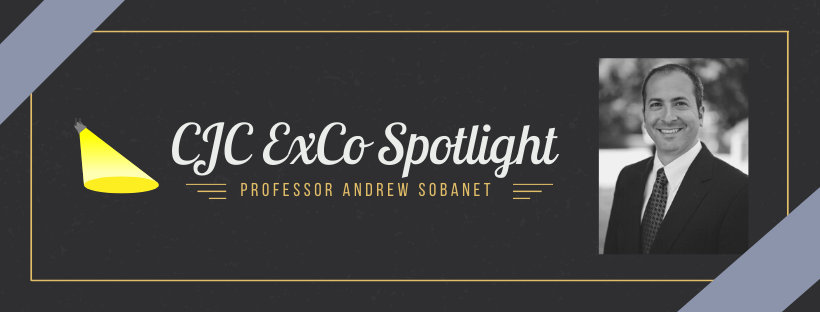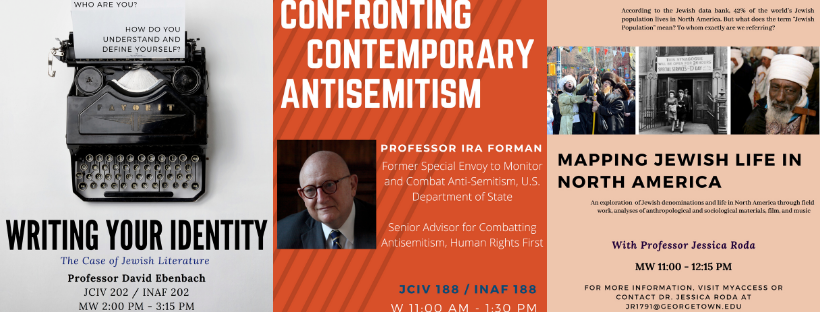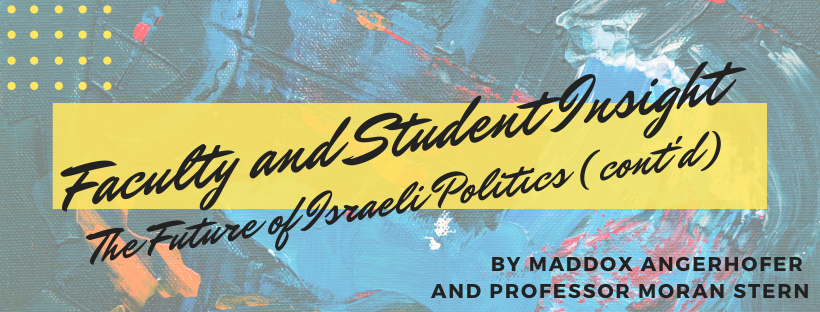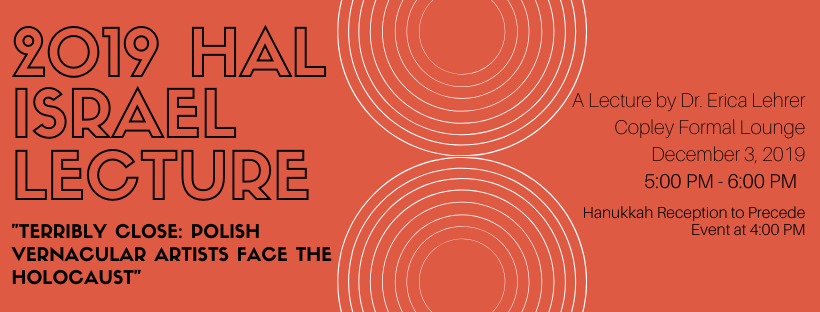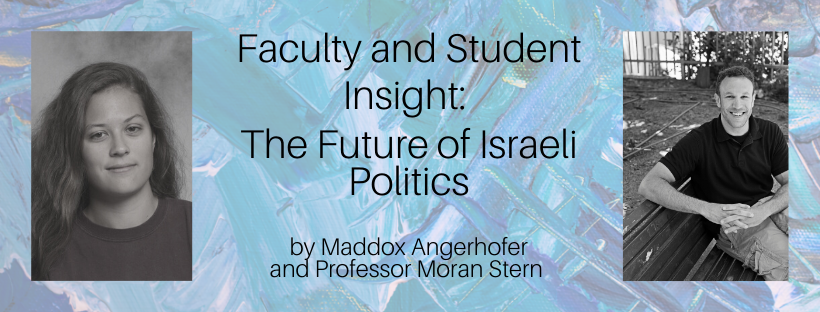RSVP for “Jewish Women in the Arts!”
The Center for Jewish Civilization and Georgetown Jewish Life invite you to our discussion, “Jewish Women in the Arts” at the Intercultural Center (ICC), Room 301 McGhee Library. RSVP to the discussion here!
About this event:
In the last decade within the ultra-Orthodox Jewish world, a new market of “women only” productions in films, theatre and music has emerged in response to the democratization of Internet and access to technology. A conversation between Dr. Jessica Roda and artist Malky Weingarten, this event covers this growing market in North America and its economic, social, and cultural implications in order to rethink feminism and women’s agency in the 21st century. The interview will take place on Wednesday, February 26, at 3:30 PM at McGhee Library (ICC 301).
About the speaker:
Trained at the School of Visual Art in New York and at the New York Film Academy, Malky Weingarten is a Frum Female Filmaker. A Hasidic artist from Borough Park, she pioneered the genre of kosher films for only women and girls. Her films are distributed throughout North America, Europe, and Israel. She is consistently investing in artistic expressions through participating in disability rights activism, as well as social and cultural actions in the orthodox worlds.
Dr. Jessica Roda joined the CJC in the fall of 2018 as an Assistant Professor of Jewish Civilization. She is an anthropologist and ethnomusicologist trained in European and North American schools and has published several peer-reviewed articles, book chapters, and a monograph (Se réinventer au present. Les Judéo-espagnols de France, 2018, Presses Universitaires de Rennes) on the political implications of Sephardic and Arab-Jewish music in France, Spain, and Morocco. Dr. Roda is currently working on a second manuscript based on her ethnography of Hasidic life in Montreal and New York City (Beyond the Sheitl: Jewish Women and Performances in the Digital Age). She teaches the courses, “Music, Politics, and International Affairs,” “Muslims and Jews. New Perspectives,” and “Mapping Jewish life in North America.”
—–
Any person with an accommodation request is welcome to email us at cjcinfo@georgetown.edu. We will try to meet these accommodation requests to the best of our ability.
RSVP for “Widen the Window,” with Dr. Elizabeth Stanley!
Join the Center for Jewish Civilization for a discussion on Widen the Window: Training Your Brain and Body to Thrive During Stress and Recover from Trauma by Dr. Stanley. RSVP here!
About the Book:
Stress is our internal response to an experience that our brain perceives as threatening or challenging. Trauma is our response to an experience in which we feel powerless or lacking agency. Until now, researchers have treated these conditions as different, but they actually lie along a continuum. Dr. Elizabeth Stanley explains the significance of this continuum, how it affects our resilience in the face of challenge, and why an event that’s stressful for one person can be traumatizing for another.
This groundbreaking book examines the cultural norms that impede resilience in America, especially our collective tendency to disconnect stress from its potentially extreme consequences and override our need to recover. It explains the science of how to direct our attention to perform under stress and recover from trauma. RSVP for Dr. Stanley’s informative talk on our eventbrite. The event will take place at ICC 301 (McGhee Library).
About the Author:
Elizabeth A. Stanley, PhD, is an associate professor of security studies at Georgetown University. She is the creator of Mindfulness-Based Mind Fitness Training (MMFT)®, taught to thousands in civilian and military high-stress environments. MMFT® research has been featured on 60 Minutes, ABC Evening News, NPR, and in Time magazine and many other media outlets. An award-winning author and U.S. Army veteran with service in Asia and Europe, she holds degrees from Yale, Harvard, and MIT. She’s also is a certified practitioner of Somatic Experiencing, a body-based trauma therapy.
—–
Any person with an accommodation request is welcome to email us at cjcinfo@georgetown.edu. We will try to meet these accommodation requests to the best of our ability.
The CJC Looks Back at “Rabbinic Practice in LGBTQ Allyship”
The Center for Jewish Civilization was pleased to host “Rabbinic Practice in LGBTQ Allyship” with Rabbi Mike Moskowitz on Wednesday, January 22. Rabbi Moskowitz lectured on opportunities that Orthodox Jewish communities have to advocate for LGBTQ issues. “The greatest advancements for modern LGBT inclusivity and equality,” stated Rabbi Moskowitz, “have come from the availability of people being able to tell their own stories.”
About the Speaker
Rabbi Mike Moskowitz is the Scholar-in-Residence for Trans and Queer Jewish Studies at Congregation Beit Simchat Torah, the world’s largest LGBT synagogue. He is a deeply traditional and radically progressive advocate for trans rights and a vocal ally for LGBTQ inclusivity. Rabbi Moskowitz received three Ultra-Orthodox ordinations while learning in the Mir in Jerusalem and in Beth Medrash Govoha in Lakewood, NJ. He is a David Hartman Center Fellow and the author of Textual Activism. His writings can be found at www.rabbimikemoskowitz.com.
“Rabbinic Practice in LGBTQ Allyship” in the News!
Missed Rabbi Mike Moskowitz’s lecture? Have no fear! A recap of Rabbi Moskowitz’s lecture can be found in a recent edition of The Hoya. Read the article, “Rabbi Urges LGBTQ Allyship Within Jewish Community,” here.
RSVP to the CJC’s First Event of the Semester!
The Center for Jewish Civilization invites you to Rabbi Mike Moskowitz’s lecture, “Rabbinic Practice in LGBTQ Allyship.” RSVP to the event here!
About the Lecture
This lecture will explore issues pertaining to the LGBTQ community in relation to Orthodox Judaism and Jewish thought. It will also deal with the practical questions that are most commonly asked and the approaches that are currently being deployed in rabbinic allyship and Jewish Law. Be sure to save your seat using our eventbrite.
About the Speaker
Rabbi Moskowitz was assigned secular, then identified as ultra-orthodox for twenty years, and now embraces a religiously non-conforming identity. He has the cultural competency and language to translate beyond the words of the text and to hear the intentionality in the rabbinic voice speaking for social justice and inclusivity.
Rabbi Moskowitz has three ultra-orthodox rabbinic ordinations. He spent a decade in the largest yeshivas in the world and studied the entire Babylonian Talmud. He founded and headed a kollel – a sacred think tank, served as a rabbi at Columbia University, and of a congregation in Harlem. Rabbi Moskowitz explored academic Talmud at Yale and at Jewish Theological Seminary, where he is currently completing a Doctorate in Hebrew Literature. As one of the leading thinkers at the intersection of trans issues and Jewish thought, he is a sought after lecturer, educator, and researcher.
—–
Any person with an accommodation request is welcome to email us at cjcinfo@georgetown.edu. We will try to meet these accommodation requests to the best of our ability.
The CJC’s Spring 2020 Events Lineup Is Here!
The Center for Jewish Civilization is pleased to announce its Spring 2020 Public events lineup! Any person with an accommodation request is welcome to email us at cjcinfo@georgetown.edu. We will try to meet these accommodation requests to the best of our ability.
January
“Rabbinic Practice in LGBTQ Allyship,” with Rabbi Mike Moskowitz
January 22, 3:30 PM – Arrupe Hall Multipurpose Room
This lecture will explore the general issues that homosexuality and transgender experiences raise for Orthodox Judaism and Jewish thought. It will also deal with the practical questions that are most commonly asked and the approaches that are currently being deployed in rabbinic allyship and Jewish Law.
Rabbi Mike Moskowitz has three ultra-orthodox rabbinic ordinations. He spent a decade in the largest yeshivas in the world and studied the entire Babylonian Talmud. He founded and headed a kollel – a sacred think tank, served as a rabbi at Columbia University, and of a congregation in Harlem. Rabbi Moskowitz explored academic Talmud at Yale and at Jewish Theological Seminary, where he is currently completing a Doctorate in Hebrew Literature. As one of the leading thinkers at the intersection of trans issues and Jewish thought, he is a sought after lecturer, educator, and researcher.
February
February 6, 3:30 PM – Intercultural Center, Room 301 (McGhee Library)
Stress is our internal response to an experience that our brain perceives as threatening or challenging. Trauma is our response to an experience in which we feel powerless or lacking agency. Until now, researchers have treated these conditions as different, but they actually lie along a continuum. Dr. Elizabeth Stanley explains the significance of this continuum, how it affects our resilience in the face of challenge, and why an event that’s stressful for one person can be traumatizing for another.
This groundbreaking book examines the cultural norms that impede resilience in America, especially our collective tendency to disconnect stress from its potentially extreme consequences and override our need to recover. It explains the science of how to direct our attention to perform under stress and recover from trauma.
Elizabeth A. Stanley, PhD, is an associate professor of security studies at Georgetown University. She is the creator of Mindfulness-Based Mind Fitness Training (MMFT)®, taught to thousands in civilian and military high-stress environments. MMFT® research has been featured on 60 Minutes, ABC Evening News, NPR, and in Time magazine and many other media outlets. An award-winning author and U.S. Army veteran with service in Asia and Europe, she holds degrees from Yale, Harvard, and MIT. She’s also is a certified practitioner of Somatic Experiencing, a body-based trauma therapy.
March
“Attitudes Towards Jews in Contemporary East Asia and Their Implications,” with Dr. Rotem Kowner
March 26, 3:30 PM – Mortara Center for International Studies
Dr. Rotem Kowner is a professor of Japanese history and culture at the University of Haifa, Israel. His background includes early childhood in a Kibbutz, military service as an executive officer aboard a missile boat, and work as a chef in an Italian restaurant in Melbourne. Kowner’s active interest in Japan has developed gradually. After majoring in East Asian studies and psychology in Jerusalem, he studied in Berlin and then moved to Tsukuba, Japan, where he obtained his Ph.D. Following postdoctoral studies at Stanford he returned to Israel to pursue an academic career. His research interests include wartime behavior in modern Japan, race and racism in East Asia, Asian Jewish communities, psychological aspects of intercultural encounters, and learning methods of Japanese scripts.
“Assassination of Lord Moyne and Palestine’s Lost Opportunity for Peace”
March 31, 5:00 PM – Mortara Center for International Studies
Dr. Bruce Hoffman has been studying terrorism and insurgency for over four decades. He is a tenured professor in Georgetown University’s Walsh School of Foreign Service and until recently was director of its Center for Security Studies and Security Studies Program. Hoffman is also visiting Professor of Terrorism Studies at St Andrews University, Scotland. He previously held the Corporate Chair in Counterterrorism and Counterinsurgency at the RAND Corporation, where he was also director of RAND’s Washington Office and vice president for external affairs. Hoffman was appointed by the U.S. Congress as a commissioner on the 9/11 Review Commission and has been Scholar-in-Residence for Counterterrorism at the Central Intelligence Agency; adviser on counterterrorism to the Coalition Provisional Authority, Baghdad, Iraq; and, an adviser on counterinsurgency to Multi-National Forces-Iraq Headquarters, Baghdad, Iraq. Hoffman’s most recent books include The Evolution of the Global Terrorist Threat (2014); Anonymous Soldiers (2015); and, Inside Terrorism (3rd edition, 2017). Hoffman is currently a Wilson Center Global Fellow, a visiting senior fellow at the Council on Foreign Relations and a senior fellow at the U.S. Military Academy’s Combating Terrorism Center.
CJC ExCo Spotlight: Professor Andrew Sobanet’s Work Selected for H-France Forum
The Center for Jewish Civilization’s ExCo member Professor Andrew Sobanet’s work, Generation Stalin: French Writers, the Fatherland, and the Cult of Personality, was recently selected for the prestigious H-France Forum! Read more about the H-Forum here.
Take A Look at Some of The CJC’s Exciting Spring 2020 Courses!
Haven’t seen all of the CJC’s exciting course offerings for the Spring 2020 semester? Be sure to check these classes out before it’s too late!
Holocaust Courses
- “Holocaust Autobiography,” Rev. Dennis McManus, Fr. Patrick Desbois, JCIV 236 / INAF 236
- “Use & Abuse of Holocaust in Politics,” Fr. Patrick Desbois, Prof. Anna Sommer, JCIV 272 / INAF 272
- “Holocaust Forensics: Fieldwork,” Fr. Patrick Desbois, Prof. Anna Sommer, JCIV 309
International Affairs / Diplomacy Courses
- “Confronting Contemporary Antisemitism,” Prof. Ira Forman, JCIV 188 / INAF 188
- “From Zionist Movement To Contemporary Israel,” Prof. Moran Stern, JCIV 230 / INAF 230
- “Debates Over Religious Freedom,” Amb. David Saperstein, Dr. Mark Chopko, JCIV 213 / INAF 255
- “Israel and World Politics,” Amb. Evrony, JCIV 256 / INAF 256
- “Israel’s National Security Decision-Making,” Dr. Sarah Fainberg, JCIV 279 / INAF 279
- “Statecraft and Negotiation,” Amb. Dennis Ross, JCIV 444 / INAF 444
Humanities and Jewish Studies Courses
- “Blacks and Jews in America,” Professors Jacques Berlinerblau and Terrence Johnson, JCIV 015 / Theo 012
- “Seven Popes and the Jews,” Rev. Dennis McManus, JCIV 166 / INAF 166
- “Mapping Jewish Life in North America,” Prof. Jessica Roda, JCIV 195 / INAF 222
- “Re-Examining the Israeli-Palestinian Crisis: Lit/Film,” Prof. Orr, JCIV 196 / INAF 196
- “Wording Your Identity: Jewish Literature,” Prof. Ebenbach, JCIV 202 / INAF 202
- “God & The Goal Posts,” Prof. Soltes, JCIV 217 / INAF 217
- “Jewish Thinkers in Modernity,” Prof. Soltes, JCIV 227 / INAF 227
- “Kabbalah In Its Contexts,” Prof. Soltes, JCIV 241 / INAF 243
- “Muslims & Jews: New Perspectives,” Prof. Roda JCIV / INAF 271
Required Certificate / Minor Courses
- “Introduction to Jewish Civilization,” Prof. Haddad, JCIV 199 / INAF 199
- “JCIV Senior Colloquium,” Prof. Sommer, JCIV 443
Hebrew
Read the Second Installment of our Faculty and Student Insight Series!
On November 19, the CJC launched its new blog series featuring insights from CJC professors and students. Maddox Angerhofer (SFS ’22) and Professor Moran Stern expounded on the future of Israeli politics after the expiration of Benny Gantz’s mandate to form a new government. In the second installment of the series, Angerhofer and Stern explore the implications Prime Minister Benjamin Netenyahu’s indictment, as well as a potential “post-Netenyahu era.”
—
What Happened
On December 21, the day after Benny Gantz’s deadline to form a government expired, the Israeli Attorney General, Avichai Mandelblit, announced his decision to indict Prime Minister Benjamin Netanyahu on three counts. These indictments, the first ever of a sitting Prime Minister, came after three years of investigation and in the midst of significant political uncertainty, as the country awaits a successful government formation by the Knesset (the Israeli parliament) or through another round of elections, which, if necessary, will most likely take place in March 2020.
On the first two charges, Case 1,000 and Case 2,000, Netanyahu was indicted for fraud and breach of trust. Case 1,000 involved Netanyahu receiving upwards of about $150,000 in gifts of luxury goods, such as bottles of champagne and cigars, from various businessmen in exchange for preferential treatment and advancement of their private interests. In Case 2,000, Netanyahu discussed with one of Israel’s largest media tycoons an arrangement in which Netanyahu would successfully pass legislation annulling the free distribution of a rival newspaper in exchange for positive portrayal in the tycoon’s media. While Netanyahu did not accept the bribery, he did negotiate the terms of the offer – as audio recordings of the meetings have shown.
On the final and most serious charge, Case 4,000, Netanyahu was indicted for bribery, fraud and breach of trust. He and members of his immediate family conveyed frequent requests for a positive portrayal of themselves and the blackening of Netanyahu’s political adversaries to another media conglomerate owner. In exchange, the Prime Minister offered to exercise his position of power to advance telecommunications regulation to the benefit of the owner.
In response to the Attorney General’s announcement, Netanyahu publicly accused Israel’s law enforcement and legal establishment of being corrupt and biased. He called the decision to indict him an attempted coup, arguing that it is in fact the investigating team who should be investigated.
The Forecast
At this juncture, Netanyahu has three primary options. He could try to get immunity from the Knesset. To receive immunity, he would need the approval of the Knesset House Committee of the parliament. Such a decision would be difficult, due to the current status of the transitional government which does not have active committees. Also, the Attorney General cannot file the indictment with the court before the Knesset reaches a decision over Netanyahu’s immunity status, a process which can start only after a new government is formed.
A second option would be to wait until he goes to trial and argue for his innocence in court. Should Netanyahu be proven guilty, he may face imprisonment. The option of a court trial, however, would not play out for quite some time, especially given the possibility of elections where Netanyahu is likely to head Likud’s list. The final option would be a plea deal whereby Netanyahu is removed from office permanently but serves reduced to no jail time.
What (or Who) to Watch
Israel may be entering the post-Netanyahu era, but this shift will not come quickly. Netanyahu will fight the indictment all the way, working tirelessly to refocus the public’s attention on what he calls a disordered, conspiratorial, politically motivated investigation. The Attorney General has stated that he will follow Israeli law in regard to Netanyahu’s continued service as Prime Minister. Unlike a minister or member of the Knesset, the Israeli Prime Minister can remain in office until there is a final court decision, even after an indictment.
The indictment has major implications for the two largest parties, Likud and Blue & White. In Likud, some had hoped that internal unrest would result in a change in leadership. However, the majority of the ministers have rallied around Netanyahu, potentially prioritizing their leader’s political survival over the viability of their party and, crucially, Israel’s rule of law. The one exception is Gidon Sa’ar, who sees himself as the next leader of Likud. He attacked Netanyahu’s rhetoric against the law enforcement authorities and called for immediate primaries to contest Netanyahu’s leadership. There may also be a shakeup within the right wing bloc as a whole, if the other right wing parties turn away from their commitments to Netanyahu, although this option seems unlikely in the short term
The main objective for Benny Gantz’s party has remained to divide Netanyahu from Likud. If Netanyahu were replaced as the party leader, the chances of Blue & White forming a coalition partnership between themselves and Likud will increase, thereby breaking the stalemate that has kept the government of Israel in limbo.
In Conclusion
Politicians on both sides view the groundbreaking indictment – as well as Netanyahu’s attack of Israel’s law enforcement authorities – as a sad and embarrassing moment, indicative of the high degree of polarization within Israeli society and politics. Netanyahu’s legal status and political conduct has become the center of this division that has impeded numerous attempts to form a government with majority support.
—
Maddox Angerhofer is a sophomore in the School of Foreign Service majoring in international politics, studying Jewish Civilization and Persian. She is also a member of the Georgetown lightweight women’s rowing team. Maddox is from Durham, New Hampshire. Moran Stern is a PhD candidate in Political Science at the University of Maryland, College Park and a Graduate Fellow in Advanced Israel Studies. Since 2012, Stern has been teaching courses at the Center for Jewish Civilization on Israel and the contemporary Middle East.
RSVP to the CJC’s Final Event of the Semester!
About the Event
The Hal Israel Endowed Lecture in Jewish-Catholic Relations is named in memory of Hal Israel (C’92) and seeks to facilitate dialogue and strengthen ties between Jews and Catholics. It explores the many ways in which members of these two faiths continue to replace ancient prejudices with cooperation and understanding in today’s world. We are excited to welcome Dr. Erica Lehrer to deliver her talk, “Terribly Close: Polish Vernacular Artists Face the Holocaust.” RSVP today!
About the Lecture: “Terribly Close: Polish Vernacular Artists Face the Holocaust”
How can Jewish-Catholic relationships play out in the form of inanimate objects? This talk examines “folk art” made by non-professional Polish artists – most of them uneducated peasants – documenting the German Nazi occupation of Poland and the Holocaust. Made largely in the 1960s and 70s, these objects are uncanny: at times deeply moving, at others grotesque, they can also be disturbing for the ways they impose Catholic idioms on Jewish suffering, or upend accepted roles of victim, perpetrator, and bystander. Cultural anthropologist and curator Erica Lehrer describes her collaboration with Polish researchers to explore the motivations, uses, and ethical implications of these works, asking whether we might view them as legitimate “arts of witness.”
About the Speaker
Dr. Erica Lehrer is sociocultural anthropologist and curator. She is currently Professor in the departments of History and Sociology-Anthropology at Concordia University, Montreal, where she also is Founding Director of the Curating and Public Scholarship Lab (CaPSL). She is the author of Jewish Poland Revisited: Heritage Tourism in Unquiet Places (Indiana University Press (2013); and editor (with Shelley Butler) of Curatorial Dreams: Critics Imagine Exhibitions (McGill-Queens 2016); (with Michael Meng) of Jewish Space in Contemporary Poland (2015); and (with Cynthia Milton et al) of Curating Difficult Knowledge: Violent Pasts in Public Places (Palgrave 2011), as well as numerous articles. In 2013 she curated the exhibit Souvenir, Talisman, Toy and in 2018-19 co-curated Terribly Close: Polish Vernacular Artists Face the Holocaust at the Kraków Ethnographic Museum (MEK) in Poland.
About the Reception
A Hanukkah reception will precede the lecture. Please arrive at 4:00 PM for food and refreshments! Save your spot here.
—
Any person with an accommodation request is welcome to email us at cjcinfo@georgetown.edu. We will try to meet these accommodation requests to the best of our ability.
Faculty and Student Insight Series: The Future of Israeli Politics
The CJC is pleased to launch its new blog series featuring insights from CJC professors and students. Our first piece was written by our very own Maddox Angerhofer (SFS ’22) and Professor Moran Stern. Their article below explores the current state of Israeli politics and offers insight into the future of both domestic Israeli politics and Israeli-U.S relations, at large.
—
The State of Affairs
In the 120-member Israeli Parliament (the Knesset), a 61 seat majority is the minimum number of seats required to form a government. As of today, neither Benjamin Netnayahu’s Likud party nor Benny Gantz’s Blue and White party have reached this threshold after two rounds of elections this year. Israel has been governed by a transitional government since the first round of elections this past April. In the September elections, Gantz’s Blue and White party won with 33 seats while Likud came second with 32. At midnight on Wednesday, November 20, however, Gantz will see his mandate to form a government expire. This leaves the composition of the future government up in the air, with major implications for Israeli domestic politics and the relationship with the U.S.
The Forecast
There are four potential outcomes from this situation. In the first and perhaps least likely, Gantz could successfully form a minority government between now and Wednesday night. This means that Blue and White and the left wing parties will form a coalition, while the Arab Joint List and Lieberman’s secular-nationalist party, Israel Beiteinu, will remain outside the coalition but will cast their support through vote or abstention. This would be the first time in Israeli history that a minority government was newly established.
In a second scenario, Gantz and Netanyahu will successfully bridge their differences and form a wide national unity government with Blue and White, Likud, and Israel Beiteinu as its anchors. This is the scenario that, at least rhetorically, all sides support.
In a third scenario, like Netanyahu before him, Gantz fails to form a government before the deadline. At midnight on Wednesday, the mandate would be turned over to the Knesset to negotiate. A 61 member majority would still be required to form the government. While Gantz or Netanyahu would be the most likely choices for prime minister, Israeli law stipulates that any member of parliament could be selected, not the leaders of the largest parties. If the Knesset does agree on a candidate, they will have two weeks to announce their government.
Should the members of parliament fail to obtain the necessary majority consensus, another unprecedented scenario would unfold: Israel would conduct its third round of elections since April 2019. Such a situation would only extend the time spent under a transitional government, continuing the paralysis of Israeli policy making.
What (or Who) to Watch
The fates of two men will play a significant role in determining the outcome of the current political turbulence. Netanyahu awaits a decision from the attorney general on his pending indictment, which is likely to be released sometime in the next few weeks. His personal freedom and political survivability have become the central driving force in Israeli politics over the last year and a half, and the decision from the attorney general is certain to create a political tsunami.
The second man to watch is Avigdor Lieberman. With neither Likud nor Blue and White commanding a majority, Lieberman’s small party has taken on an outsized role in determining who can reach the threshold to assemble a government. He has said he would only be willing to join a liberal national unity government with Likud, Blue and White, and Israel Beiteinu, at the exclusion of right-wing religious and ultra-Orthodox parties. The eight seats won by Israel Beiteinu in the September election have become the focal point of coalition building, putting Lieberman in the position of kingmaker.
Implications for the U.S.
President Trump had hoped close ties with Netanyahu could boost his efforts to win a second presidential term by mobilizing American conservative Jews and Evangelicals. The recognition of Israeli sovereignty over the Syrian-occupied Golan Heights and Jerusalem as the capital of Israel, along with the subsequent relocation of the American embassy in late 2017, represented strong goodwill gestures toward Netanyahu. Even more significant was Trump’s decertification of the Iran Nuclear Deal (JCPOA) and the classification of the Islamic Revolutionary Guard Corps (IRGC) as a terrorist organization. Since Netanyahu’s two consecutive failures to win elections, Trump has altered his tactics to be less explicitly focused on supporting Netanyahu, and more amicable toward Israel as a whole. This change comes as the future of Israeli leadership remains uncertain. Finally, the release of the “deal of the century” on the Israeli-Palestinian issue will likely be delayed until such a time as Israel can produce an elected government. This timeline may keep the contents of the deal undisclosed until after the U.S. presidential election.
—
Maddox Angerhofer is a sophomore in the School of Foreign Service majoring in international politics, studying Jewish Civilization and Persian. She is also a member of the Georgetown lightweight women’s rowing team. Maddox is from Durham, New Hampshire. Moran Stern is a PhD candidate in Political Science at the University of Maryland, College Park and a Graduate Fellow in Advanced Israel Studies. Since 2012, Stern has been teaching courses at the Center for Jewish Civilization on Israel and the contemporary Middle East.

